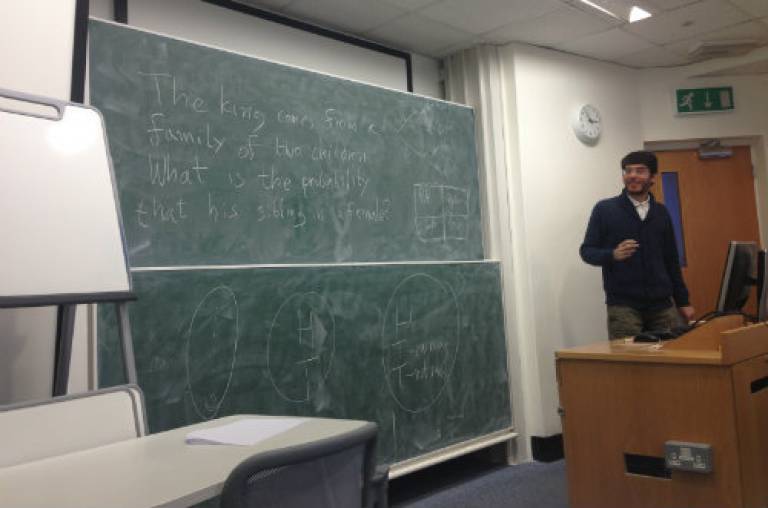“UCL Arena One has helped me to think differently about my teaching”
Sypros Poulimenos shares how his teaching has developed through the UCL Arena One fellowship application process and explains some of the techniques he has adopted.

7 December 2015
"As a postgraduate teaching assistant (PGTA) studying statistics, I have two teaching roles:
- as a tutor for a first year statistical science module
- a demonstrator during computer workshops
I have recently gained associate fellowship of the Higher Education Academy (HEA) following a successful UCL Arena One application.
Creating an environment where students are able to participate
Tutoring on the first-year undergraduate statistics module (Introduction to Probability and Statistics) includes students from across the department of statistics but also other programmes across UCL.
I set and mark formative exercises each week which are then revised during each tutorial.
The group consists of 20 students – a large tutorial group which means it can sometimes feel intimidating for students to contribute, particularly as the tutorials are often on-the-spot problem solving.
My solution has been to ask for answers once they have had a chance to discuss the problems in smaller groups of three or four students.
I pair quiet students with the more confident and ask all students to input.
The tutorial groups are not homogenous in terms of ability and time is tight so often the problems we collectively tackle are the ones the students most struggle with during the assessments.
Dealing with mixed abilities
Another issue is that those who are better able to complete the problems can feel that we are going through problems too slowly however it is important all the students can fully grasp how to achieve the correct answer.
To solve this, I give back the work I have towards the end of the session so all students are encouraged to pay attention.
I also ask additional questions not included in the assessments.
I am proposing, through case study, that these tutorial groups are split by ability after two or three initial sessions and for the tutors to decide on the basis of initial assessed work.
It would allow the tutorials become more focussed to students’ needs and therefore the time could be better utilised.
Using peer-assisted learning
Within the computer workshops (mathematical investigation skills), I assist undergraduates to understand the programming side of statistics.
With three demonstrators in a class of 70 students, and many unfamiliar with the skills required, it has proved easiest to pair the students and encourage them to work on a problem together at one computer.
Through peer-learning, students discuss an issue first which ensures they can work it out between them and approach us about complex issues.
I also give them live feedback throughout the session, passing on hints rather than answers, to give them a full opportunity to learn.
Attendance has increased: the module leaders and students agree that this approach proves less overwhelming and ensures all students get a chance to discuss the exercises with someone.
How attending Arena events has developed my approaches
Many of these approaches came about through the UCL Arena process.
I attended many of the ‘exchange’ and ‘essentials’ sessions and explored different teaching styles within each; learning from experienced teachers (and instructors) as well as from and with other postgraduate teaching assistants from across UCL.
Initially, I wanted to deal with specific teaching concerns and get tailored advice but as the process went on I understood that teaching depends on context and there is no ‘100% correct approach’.
It was more beneficial to hear possible solutions and general advice and then to tailor them to my own teaching experience.
The peer discussion and ‘evidence-based’ approach has broadened my knowledge of teaching methods and encourages me to trial different techniques. Through discussing so many different approaches, I have been able to see how valid they can be for difference classes, content and students.
We are taught how to be good researchers but it is less obvious how to be a good teacher.
I enjoy teaching, but I also like to teach with high quality standards so I keep myself up-to-date by attending relevant UCL Arena workshops about appropriate teaching methods in higher education, which I apply to my teaching.
The UCL Arena events approached many specialised topics so I was able gain a broad understanding of many techniques which I now supplement by reading academic papers on teaching or best practice and taking time for peer discussion.
The feedback I’ve received
The teaching evaluations have been quite promising and positive with students particularly highlighting how useful the feedback I have provided has been.
They have commented how individual and supportive it is: I do try to include ideas for improvements and quicker or alternative ways of answering questions (particularly for those without any errors).
I also make the feedback personal to each person’s attempt by giving hints rather than the answers and then encouraging students to approach me for extra guidance or clarification after the session.
Amongst colleagues, opportunities for peer discussion have also given me good feedback; I enjoy talking and learning from colleagues both in the department and outside as I get further ideas for solutions and improvements. I also invite colleagues to sit in my sessions, and vice-versa, so we get direct feedback from each other.
 Close
Close

